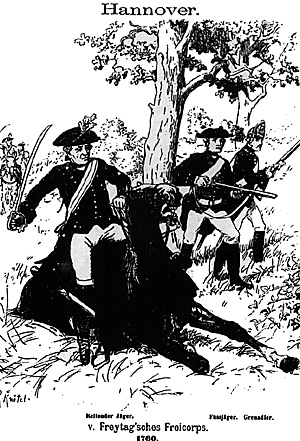 In the spring of 1757 France entered the Seven Years War by invading
western Germany. To the east, the Kingdom of Prussia had been locked in
warfare with the Austrian Empire since the previous year. France was
Austria's ally. An attack by the French on Frederick's strategic right flank
would relieve pressure on the hard pressed Austrians. Even more
importantly for France's interests, if the Electorate of Hanover could be
subjugated, a heavy blow would be struck against the British Crown, the
inveterate enemy of the French during this period (they still don't like each
other much).
In the spring of 1757 France entered the Seven Years War by invading
western Germany. To the east, the Kingdom of Prussia had been locked in
warfare with the Austrian Empire since the previous year. France was
Austria's ally. An attack by the French on Frederick's strategic right flank
would relieve pressure on the hard pressed Austrians. Even more
importantly for France's interests, if the Electorate of Hanover could be
subjugated, a heavy blow would be struck against the British Crown, the
inveterate enemy of the French during this period (they still don't like each
other much).
Hence, in early April two French armies moved across the border into Germany to open the invasion. 70,000 men under Marshal le Comte d'Estrees (pronounced Destray) advanced northeast through Hesse and Westphalia (strategic map). Concurrently, a smaller French army under that fun-loving incompetent, LieutenantGeneral the Prince de Soubise, moved east through southern Germany on its way to support Austrian operations in Bohemia. Most of us already know about Soubise's march to disaster at Rossbach. The focus of this study is D'Estrees's campaign against the Hanoverians, of which the Battle of Hastenbeck was a pan.
The Hanoverian "Army of Observation" in western Germany, about 40,000 strong, did not initially oppose d'Estrees movements. Influential elements within the government of Hanover were actually in sympathy with the Austrians, and not enthusiastic about throwing in with the Prussians by forcibly resisting the French invaders. The Hanoverians hoped the French could be persuaded to halt the invasion through diplomacy. The following quote from Savory's history of the war in western Germany gives the flavor of the campaign through early May, when it became obvious that the French were resolved to occupy Hanover:
- "Until then the facade had been presented of two forces facing
each other with all the punctilio of the period, fastidiously evading
descent into vulgar brawl. Letters had passed between the two
commanders, Cumberland signing himself votre ami affectione; and
doubtless receiving from d'Estrees missives
couched in similar terms; while all the time the French were devouring
the land, and pouring reinforcements into their advanced positions at
Munster and Uppstadt. "
By the time the Hanoverians realized war was inevitable, much of western Germany had fallen to the French, and D'Estree's army was nearing the border of Hanover.
The Battle of Hastenbeck July 26, 1757
- The Military Situation in Western Germany, 1757
Movements to Battle
Prelude to Battle
Battle of Hastenbeck Begins
Aftermath
Wargaming Hastenbeck
Back to Seven Years War Asso. Journal Vol. VII No. 3 Table of Contents
Back to Seven Years War Asso. Journal List of Issues
Back to Master Magazine List
© Copyright 1994 by James E. Purky
This article appears in MagWeb (Magazine Web) on the Internet World Wide Web.
Other articles from military history and related publications are available at http://www.magweb.com